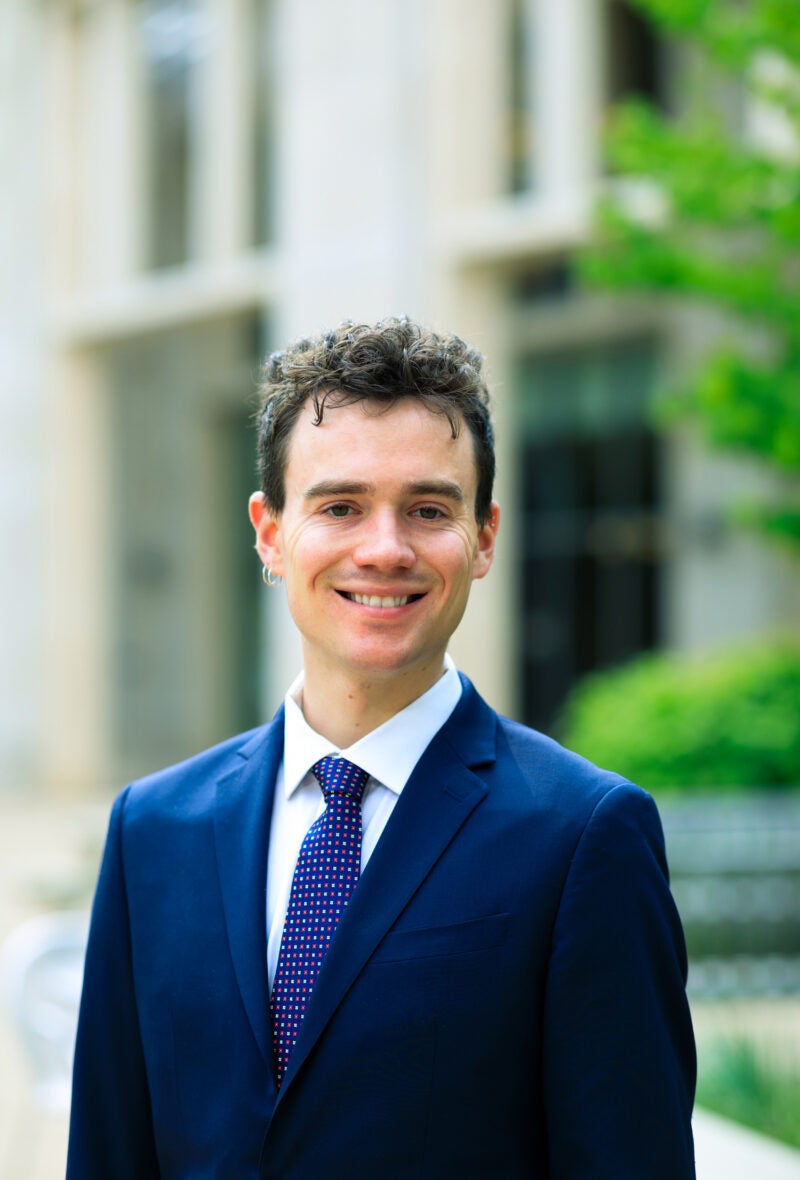Alex Ropes is the recipient of the third annual Kristin P. Muniz Memorial Award. Ropes is recognized for his commitment to justice and superb client-centered representation at the Criminal Justice Institute (CJI). This annual award honors the late Kristin P. Muniz, a former Harvard Law School senior clinical instructor, whose untimely death in 2020 was heartbreaking for everyone at CJI, her many former students, and her colleagues in the clinical and pro bono program. For ten years, Muniz was a zealous criminal defense attorney, beloved instructor, and trial team coach at CJI. This award recognizes a graduating student who, like Muniz, has demonstrated an exemplary dedication to client-centered representation in criminal courts and has focused their efforts on racial justice and equality, respect for human dignity, fairness, diversity, and compassion.
Ropes, like Attorney Muniz, truly cares about the work of client-centered advocacy, says clinical professor of law Dehlia Umunna, faculty deputy director of the Criminal Justice Institute. “He embodies the values and ideals that made Kristin so special,” Umunna continues. “He is brilliant, kind, and has a great sense of humor. Additionally, Alex is a wonderful team player, beloved by everyone at CJI!”
While at HLS, Ropes has been a member of the Harvard Prison Legal Assistance Project (PLAP), the LGBTQ+ Advocacy Clinic, and the Criminal Justice Appellate Clinic, in addition the Criminal Justice Institute. In the fall, he will work as a law clerk on the U.S. District Court for the District of Massachusetts. After clerking, Ropes intends to work as a trial-level public defender.
“My time representing clients—particularly as a student in CJI—has been the most rewarding part of my law school experience,” says Ropes. “Our clients are almost always the victims of intersecting systems of race-, class-, and gender-based oppression. I am perpetually humbled by the trust that my clients place in me to listen to their experiences, advocate for them, and tell their stories to prosecutors and judges. Forming relationships with clients through CJI and PLAP has been the greatest privilege of my time at HLS. I am indebted to the many mentors—including but not limited to Ashley Carter, Alexander Chen, Anya Marino, Devi Rao, Ed O’Brien, Audrey Murillo, and Professor Dehlia Umunna.”
“As Alex’s clinical instructor, I am thrilled to congratulate him on receiving the Kristin Muniz Memorial Award,” says clinical instructor Audrey Murillo. “Alex not only achieved remarkable results for his clients during his time at CJI, but he also demonstrated a principled work ethic, a humble nature, and a courage to speak truth to power. These are the qualities that reflect the values of the award’s namesake and make Alex a worthy recipient of this honor. I learned as much from Alex as I hope he did from me, and I look forward to following his career and life path.”
Like the award’s namesake, Ropes demonstrated his commitment to justice regardless of any obstacles he faced. In one particular case, after exhausting all efforts to convince the prosecutor to reduce his client’s case from a felony to a misdemeanor, Ropes went to work for his client, preparing for his first-ever jury trial. His hard work paid off, and the judge allowed his Motion for Required Finding on the felony charge, reducing the charge to the misdemeanor Ropes had advocated for all along.
Motivated by another client’s young age and commitment to turning his life around by going back to high school after dropping out, Ropes did not stop advocating when the assigned prosecutor rebuffed his efforts for a resolution that would preserve his client’s record. He found a relevant case precedent and was able to successfully litigate a motion to dismiss.
In yet another case, Ropes convinced the court to dismiss his client’s charges by making the creative argument that because the Boston police arrested his client in Cambridge, they acted in their private capacity as citizens. Since those confining him were not acting in the official capacity as “police,” the case was dismissed because his client could not have committed the crime of resisting arrest against officers.
Through it all, Ropes found great meaning in his work through the connections he built with his clients. “We meet our clients as complete strangers, yet we must immediately ask them to trust us—not only to advocate for them in the courtroom, but also to believe their stories, to hold their confidences, and to see them as more than just another ‘defendant,’” he reflects. “I often felt absurd asking clients to trust me in this way—I’m only a third-year law student after all—but time and time again, my clients chose to open up to me and tell me their stories—not just their troubles, but also their joys. I had clients tell me about their families, their kids, and their favorite music; of the degrees they plan to obtain and the jobs that they’re pursuing; of moving into a new apartment after spending over five years without a house. I even had a client invite me to his high school graduation, which I’ll be attending this June. Although I won a motion to dismiss the charges against him this April, it will be the sight of him walking across the graduation stage that I’ll carry with me years from now.
“More than his legal prowess, Ropes has the compassion that this award demands,” says Umunna. “Ropes’ advocacy so moved the client; he told Ropes that no one had ever fought for him that way before. And after a probation hearing, where Ropes cross-examined officers with the skills of an advanced practitioner, a person in the audience chased Ropes into the hall, asking him if he would be his lawyer because he could tell Alex cares about his clients. These are the true examples of excellence in client-centered representation and respect for human dignity, fairness, diversity, and compassion.”
Want to stay up to date with Harvard Law Today? Sign up for our weekly newsletter.
